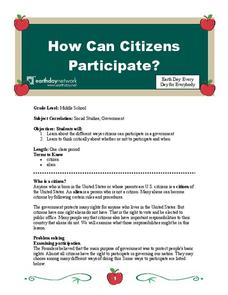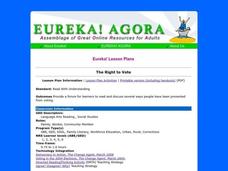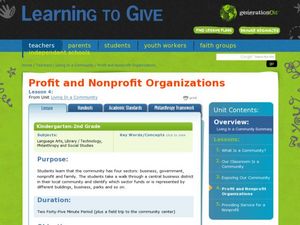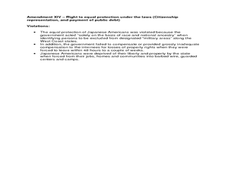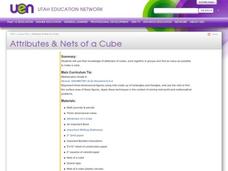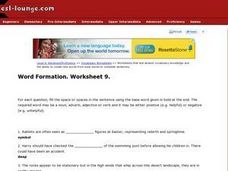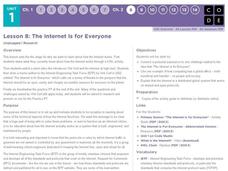Curated OER
Role Playing Free Speech
Students conduct research into looking at a free-speech issue. They role play the events surrounding a court case. The lesson includes guiding questions to help create context and determine areas of further study. The presentation...
Curated OER
How Can Citizens Participate?
Students discuss the role of citizens in society and in government. Working in groups, students list ways in which individuals can participate in government as well as the advantages and disadvantage of that participation. Each group...
Curated OER
The Right to Vote
Students are provided a form for learner to read and discuss several ways people have been prevented from voting. Students relate what they know and discovered about voting rights for different population of people. They establish a...
Curated OER
Living in the Community
Students explore the differences between the four sectors of business. In this nonprofit business lesson, students give examples of needs met by businesses and the importance of the community nonprofit sector.
Curated OER
Overcoming Censorship Through Art
Students create an art piece that expresses their opinions while circumventing hypothetical government restrictions in this lesson on art and government censorship. Emphasis is placed upon historical instances of censorship around the...
Curated OER
"State of Emergency in Nepal"
For this grammar worksheet, students read the story "State of Emergency in Nepal" and fill in the fourteen blanks with the correct form of the word given in bold.
Curated OER
The Bill of Rights And Japanese Internment
Students review the Bill of Rights. They interpret how the American Government violated these rights with regard to Japanese Americans during World War II. They write down the violations of the Bill of Rights during Japanese ...
Curated OER
Is FEMA a Natural Disaster?
Learners develop an understanding of FEMA and reflect about the consequences of a natural disaster. In this natural disaster lesson, students are asked specific questions after reading several stories. After class discussion on the...
Curated OER
Let the Campaign Begin
Students differentiate between positive and negative personal attributes and select a fictional character for nomination who personifies the qualities of a good leader. They use the Internet to learn about the election process and write...
Curated OER
Diaper Inquiry
Fifth graders carefully examine and investigate the products contained in a diaper. They particularly analyze the crystal sodium polyacrylate, a product developed for use in astronaut diapers. They follow the scientific method, forming...
Curated OER
The Wind & Sun: Powerful Alternatives
Students examine the power that is possible from the sun through an interactive program. They also analyze how energy turns into different forms in different parts of the human body. They finally explore how wind is created and how wind...
Curated OER
Eatem Up!
Students identify, interpret and demonstrate a positive learning attitude. They identify, comprehend and use basic concepts and skills and then, communicate clearly in oral, artistic, written, and nonverbal form. Students also identify...
Curated OER
Attributes & Nets of a Cube
Third graders engage in a lesson that focuses on the attributes and forming of a cube. They construct a cube using different combinations while comparing a square with only two-dimensions. Students fold paper while following the...
Curated OER
Word Formation Worksheet 9
In this ESL spelling worksheet, students will focus on vocabulary enhancement. Students will complete 10 fill in the blank questions, by reading each sentence using the correct form of the given base word to complete each.
Curated OER
Government Lesson Plan 18
High schoolers identify problems with a pure market economy, and examine and explain roles of selected regulatory agencies.
Curated OER
Mock Congress
High schoolers simulate the legislative process of law-making by assuming different roles. They investigate the process by writing a bill on any subject of his/her own choice
EngageNY
Polynomial, Rational, and Radical Relationships
This assessment pair goes way beyond simple graphing, factoring and solving polynomial equations, really forcing learners to investigate the math ideas behind the calculations. Short and to-the-point questions build on one another,...
Code.org
The Internet Is for Everyone
What is this thing called the Internet? A KWL activity elicits what the class knows about how the Internet works. Then pupils read a copy of a memo about the need to keep the Internet open and accessible by everyone.
National Endowment for the Humanities
Factory vs. Plantation in the North and South
North is to factory as South is to plantation—the perfect analogy for the economy that set up the Civil War! The first lesson in a series of five helps teach beginners why the economy creates a driving force for conflict. Analysis of...
Curated OER
Different Viewpoints - Loyalist or Patriot
Third graders use primary sources to study U.S. history and government. In this primary sources lesson, 3rd graders practice gathering information from "eye witness" accounts of history.
Curated OER
Montreal Drivers: A Negative View
In this negative verb forms activity, students complete a 15 question multiple choice on-line interactive exercise. Students read a sentence about bad drivers in Montreal. Students change the verb in bold type to the negative form.
Curated OER
Declaration of Independence and the Constitution
Fifth graders read a rewritten version of the Declaration of Independence, create a set of pictures illustrating the Preamble of the Constitution and create a version of the Declaration of Independence in the form of a song, a poem,...
Curated OER
Good News and Bad News: Income and Taxes
Students examine Internal Revenue Service (IRS) Form 1040, citing particular line items that are pertinent to an artist acting as an entrepreneur. They explore various sources of income and the importance of keeping accurate income records.
Curated OER
The Middle East
Students investigate the countries of the Middle East. In small groups, they conduct Internet research, conduct a debate, draw and label a map, and present their information to the class in the form of a presentation.



